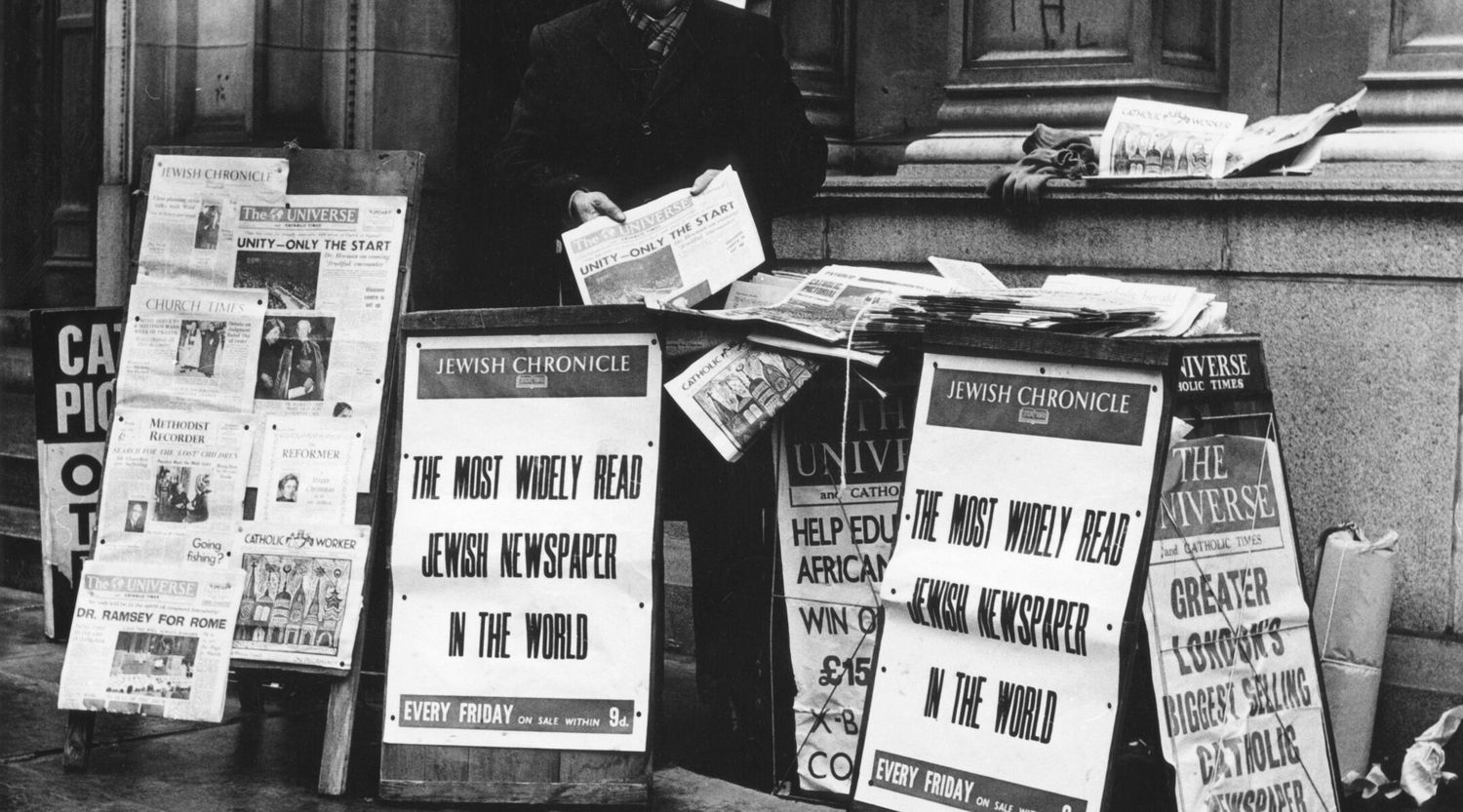
Did you know that The Jewish Chronicle is the oldest continuously published Jewish newspaper in the world? Founded in 1841, this London-based weekly has been a cornerstone of Jewish journalism for nearly two centuries. From its early days under Rabbi David Mendola and Moses Angel to its current editorial leadership, The Jewish Chronicle has weathered financial struggles, editorial controversies, and changing ownership. Despite these challenges, it remains a vital source of news, cultural insights, and community solidarity for Jews in the UK and beyond. Whether covering the Israel-Gaza conflict or celebrating Jewish cultural achievements, The Jewish Chronicle continues to be a trusted voice in the Jewish community.
Key Takeaways:
- The Jewish Chronicle, founded in 1841, has weathered financial struggles and editorial shifts, but remains a vital institution in Jewish culture and history.
- Despite facing challenges, The Jewish Chronicle holds potential for a promising future, with hope for new forms of media support and community resilience.
The Jewish Chronicle: A Historical Overview
The Jewish Chronicle, often called the JC, holds a special place in the hearts of the Jewish community. Its long history and significant impact make it a fascinating subject. Let's explore some key facts about this iconic publication.
-
Founding and Early Years
The Jewish Chronicle was founded on November 12, 1841, by Rabbi David Mendola and Moses Angel. Initially a monthly newspaper, it quickly transitioned to a weekly publication. -
First Issue
The first issue aimed to provide "religious and moral instruction; local intelligence, historical information, and facts, exclusively Jewish; original articles; and textbooks." -
Editorial Leadership
Rabbi David Mendola and Moses Angel served as the co-founders and editors from 1841 to 1844, setting the tone for the newspaper's commitment to the Jewish community. -
Early Challenges
Financial struggles and competition from other Jewish newspapers marked its early years, but it managed to maintain its position as a leading voice.
Shifts in Editorial Stance and Influence
Over the years, The Jewish Chronicle has seen significant changes in its editorial stance and influence, particularly concerning Zionism and its role in the Jewish press.
-
Zionist Influence
In December 1906, L.J. Greenberg and other investors bought The Jewish Chronicle to promote Zionism, marking a significant editorial shift. -
Monopoly in Jewish Press
By the early 20th century, The Jewish Chronicle had gained a near monopoly, taking over competitors like The Hebrew Observer and The Jewish World. -
Counterbalancing Voices
In October 1919, The Jewish Guardian emerged as a strong opposing voice but disappeared in 1931, leaving The JC as the primary voice. -
Pro-Israel Stance
After 1948, The Jewish Chronicle maintained a pro-Israel attitude, reflecting the growing support for Israel within the Jewish community.
Ownership and Editorial Changes
Ownership and editorial leadership have played crucial roles in shaping The Jewish Chronicle's direction and policies.
-
Kessler Family Ownership
By the early 1960s, the Kessler family owned 80% of the shares. David F. Kessler created a foundation ownership structure to safeguard its future. -
Editorial Changes
In the late 1930s, David F. Kessler became managing director. After World War II, he installed a moderate editor to replace the right-wing Zionist editor Ivan Greenberg. -
Notable Contributors
Joseph Finklestone wrote for The Jewish Chronicle from 1946 to 1992, covering various roles and topics. -
Editorial Leadership Continuity
Geoffrey Paul served as editor between 1977 and 1990, maintaining the newspaper's pro-Israel stance while addressing broader community issues.
Legal and Ethical Challenges
The Jewish Chronicle has faced several legal and ethical challenges over the years, impacting its reputation and credibility.
-
Lawsuits and Rulings
In 1968, The Jewish Chronicle claimed Labour MP Christopher Mayhew made antisemitic comments. In April 2023, IPSO upheld a complaint about a false Holocaust denial claim, highlighting ethical concerns. -
Chief Editors
The newspaper has seen various chief editors, including Rabbi David Mendola, Moses Angel, Joseph Mitchell, and more recently, Jake Wallis Simons.
Financial Struggles and Rescue Efforts
Like many print media outlets, The Jewish Chronicle has faced financial difficulties, leading to significant changes in ownership and structure.
-
Financial Struggles
The newspaper has been suffering financially for several years due to competition from online media and falling advertising revenue. -
Rescue by Consortium
In 2020, a consortium led by Sir Robbie Gibb rescued The Jewish Chronicle, raising concerns about editorial control and funding transparency. -
Funding Transparency
Almost no one knows who currently funds The Jewish Chronicle, leading to speculation about potential influence over editorial content. -
Editorial Independence
The recent announcement of turning into a charitable trust has raised questions about editorial independence and external influences.
Coverage and Controversies
The Jewish Chronicle's coverage of sensitive topics has often sparked controversy, affecting its reputation and relationship with the community.
-
Coverage of Israel-Gaza Conflict
The newspaper's recent coverage has been criticized for perceived bias, consolidating the idea that the Jewish community abroad is complicit with the IDF's actions. -
Editorial Behavior on Social Media
Current editor Jake Wallis Simons has been accused of behaving like a political activist on social media, raising concerns about impartiality. -
BBC Impartiality
Sir Robbie Gibb's dual role as a BBC director and owner of The Jewish Chronicle raises concerns about impartiality.
Cultural and Community Impact
The Jewish Chronicle has had a profound cultural and community impact, making it an integral part of Jewish life.
-
Historical Significance
The newspaper has been an integral part of Jewish history and culture for nearly two centuries, covering significant events and community issues. -
Cultural and Intellectual Coverage
Known for its rich coverage of cultural and intellectual events, it has featured articles on books, plays, concerts, and more. -
Freelance Contributors
Freelance contributors have played a significant role, adding diverse perspectives and personal experiences to the content. -
Yiddish Lexicon
The use of Yiddish words in everyday life, particularly by non-Jewish contributors, adds to the cultural richness of the content.
Community Focus and Resilience
The Jewish Chronicle has always focused on the interests and concerns of the Jewish community, showing remarkable resilience and resourcefulness.
-
Community Focus
The newspaper has provided a platform for discussion and solidarity, particularly during times of rising anti-Semitism. -
Resilience and Resourcefulness
Despite financial struggles, The Jewish Chronicle has shown remarkable resilience and resourcefulness, reflecting the community's enduring spirit. -
Potential Rebirth
There is hope for the newspaper's future, with the potential for new forms of media support and community resilience.
Historical Milestones
The Jewish Chronicle has achieved several historical milestones, marking its journey from a small publication to a significant institution.
- 1841: Founded by Rabbi David Mendola and Moses Angel.
- 1906: Bought by L.J. Greenberg and other investors to promote Zionism.
- 1919: Gained a near monopoly in the Jewish press.
- 1931: The Jewish Guardian emerged as a counterbalance.
- 1948: Maintained a pro-Israel stance.
- 1960s: Kessler family owned 80% of shares.
- 1977: Geoffrey Paul became editor.
- 1990s: Ned Temko and David Rowan served as editors.
- 2008: Jeff Barak became managing editor.
- 2020: Rescued by a consortium led by Sir Robbie Gibb.
Current State and Future Prospects
The Jewish Chronicle faces significant challenges but also holds potential for a promising future.
-
Current State
The newspaper is currently facing financial struggles and concerns about editorial independence, raising questions about its future. -
Future Prospects
Despite challenges, there is hope for its future, with the potential for new forms of media support and community resilience ensuring its continued role as a vital institution.
The Legacy of The Jewish Chronicle
The Jewish Chronicle, often called the JC, stands as a testament to resilience and dedication within the Jewish community. Founded in 1841, it has weathered financial struggles, editorial shifts, and changing ownership. Despite these challenges, it remains a vital source of news and cultural insight for Jews in the UK and beyond. From its early Zionist leanings to its current pro-Israel stance, the JC has consistently reflected the evolving concerns and interests of its readers. Notable editors and contributors have shaped its voice, ensuring it stays relevant. Today, questions about funding transparency and editorial independence loom, but the community's support and the paper's rich history offer hope for its future. The Jewish Chronicle isn't just a newspaper; it's a cultural cornerstone, continuing to inform and unite the Jewish community.
Frequently Asked Questions
Was this page helpful?
Our commitment to delivering trustworthy and engaging content is at the heart of what we do. Each fact on our site is contributed by real users like you, bringing a wealth of diverse insights and information. To ensure the highest standards of accuracy and reliability, our dedicated editors meticulously review each submission. This process guarantees that the facts we share are not only fascinating but also credible. Trust in our commitment to quality and authenticity as you explore and learn with us.


